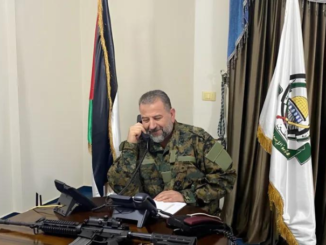
Gazans find creative ways to cool off when the electricity goes out during one of the hottest summers ever.
Shall I compare thee to a summer’s day … when the electricity only lasts for eight hours?
In the 25 years I’ve lived in Gaza, I’ve never enjoyed electricity for 48 hours straight.
Had Shakespeare lived in Gaza, he certainly would not compare anything of beauty to this scorching summer.
Here Gazans have to get creative to get any relief under an Israeli blockade – where electricity gets cut off after eight hours–and sometimes after just six, or even four.
This year, a global heatwave, brought on by climate change, has made summer even more intense. That’s why, for Gazans, “to be or not to be” is not the question. The question is how to get everything done during the hours in which electricity is available. This is the central focus of our lives. It’s always a worry. Even sleeping at night becomes a challenge.
A Funny Fan
As I stood at the doorstep of my neighbor Ahmed’s house, I could feel the heat rising from the floor, wave after wave. I expected it to be hot because the ceiling of Ahmed’s house is made of asbestos, a material that is known for retaining heat. Still, the intensity of the heat was surprising.
In Palestine, it is a custom that senior high school (or Tawjihi) grade point averages get announced publicly, and everyone gets together to celebrate the students who graduated by lighting fireworks, performing the dabke dance, and enjoying traditional desserts.
That’s why my uncle and I went to see Ahmed, a Tawjihi graduate, and brought along a plastic plate full of Burma Baklava, a popular rolled version of the traditional sweet phyllo pastry filled with nuts and honey.
As my uncle and I walked over to Ahmed’s, it was already unbearably hot. The sun was scorching, and I could feel the heat from the ground through my slippers. It almost felt as if I were barefoot, and the ground was blistering my soles with every step.
As happy as I was to gather with neighbors and friends, it was hard to distract ourselves from the unrelenting heat. Inside, it felt as if I were standing over a huge pot of boiling water, with the steam crashing upon my face. The guests who were already in Ahmed’s small guest room were the last straw. Every time I inhaled, I felt as though I were drawing in another guest’s exhaled breath.
It was then that I noticed something—the weirdest fan I’d ever seen settled in a far corner of the room; its pedestal made out of a piece of old, thin, gray pipe. It looked familiar. I glanced down at my hands and then back to the fan, and it hit me! The fan’s blades were shaped from a plastic dessert plate just like the one I was holding.
“Wow! Such a funny fan you have in here, Ahmed,” I said. How does it work?”
“I found an old broken juice mixer, so I took its generator,” Ahmed explained. “I cleaned it, fixed it, rebuilt it the way you see now, and connected it to my father’s motorcycle’s old battery. Necessity is the mother of invention, you know.”
As I looked at the fan, something else suddenly came to my mind. Just a few days earlier, my little cousin was also fanning himself using a plastic dessert plate. He was sprawling on the couch opposite me on my house’s rooftop, holding the plate loosely with maybe two fingers and moving it only slightly.
Suddenly, his fan plate hit the floor. I thought he fell asleep. So I went close to check on him, but he was still sharp and wide awake. I could feel the heat radiating from his forehead. He was sweating as if he’d just run a marathon. “Don’t worry,” I told him. “It is almost 10:00 p.m., and shortly, the electricity will be on.”

Electricity Shortage
The electricity shortage, enforced by the Israeli blockade on the Gaza Strip since 2006 – just a few months after Ahmed was born– intervenes with the daily schedule of more than two million Gazans and disturbs their peaceful nights.
Even though electricity typically lasts for eight hours, it comes on at different times in different places, causing more disruption. Where I live, for instance, we sometimes get those eight hours early in the morning, while the power is still off in a nearby area.
The unpredictability has turned Gazans into some of the most organized people you will ever meet, as they constantly try to figure out how to complete all their domestic and work tasks within the eight hours they have power.
Yet, the real struggle starts the second after the electricity goes off. If you ever wonder why I would be sitting with my little cousin on the rooftop with an LED light linked to an old battery between us, here is the reason: the rooftop, or any open space, is often Gazans’ only shelter from the brutal nighttime humidity when there’s no electricity.
Sleeping on the Rooftops
Ironically, one of the things the current heatwave has in common with the Israeli attacks on Gaza is that, amid both, Gazans have sleeping troubles at night.
During multiple recent aggressions, the Israeli army focused its attacks after midnight, preventing children, elders, and every other resident in Gaza from having a good night’s sleep. That’s why most people in Gaza are extra vigilant at night.
The same goes for the sweltering weather. Gazans are alarmed by the nights, for temperatures sometimes reach 32 C° (90 F°), not to mention the very high humidity. And still, we spend most of these nights with no electric-powered fans or air conditioners.
As a result, one of the habits that Gazans developed throughout 17 years of the ongoing blockade is sleeping on the rooftops under the glowing stars of the Milky Way. We’re not stargazing in an attempt to catch a shooting star to make an extraordinary wish. Our only wish is a good night’s sleep.
Therefore, at the beginning of every summer, Gazans build something called Arisha or Orreasha on their rooftops. Arisha or Orreasha is a tent made of the leaves of palm trees. Many houses in Gaza have one.
Inside the Arisha
Back in my childhood, when my siblings and I gathered inside the Arisha, we used to circle around each other to play and sometimes to sing. One of the most famous games I used to play as a kid while sleeping up there was called Taq taqiyah.
This game has its own song, but my father, an engineer, mixed up the lyrics a bit. One night, we were playing Taq taqiyah on the rooftop. And, of course, there was no electricity. It was all dark until my father came along.
He got close to us and stood right behind my sister’s shoulder while we were singing the game’s song. I never got to catch his face because there was an actual light beam coming out from his forehead.
I squinted to get a better look. It was a light alright: a small light bulb that he stuck in the middle of an old computer’s headphones with some glue, and on one side of the headphones, there was a small cell phone battery connected to the lightbulb. That handmade flashlight was the coolest flashlight I have ever seen.
“How about changing the lyrics, so it fits with the surroundings,” he said. “Hear me out! It’s really cool:
Taq Taq Taqiyah
Olitean wi olyiah
Ya rabi tigi el kahrab (Oh God! Let the electricity be on again)
wi ninam nomah haniyah (So we can have a good night’s sleep)
Ever since that night, we forgot about the original lyrics, and we always sang it with this remix. To this day, I am attached to this song–and those memories.
“Here is your can of soda, Qasem.” Someone mumbled. I looked up in a haze with a goofy grin crafted on my face. It was Ahmed’s older brother, Tamer. I realized I’d been reminiscing, even as the rivulets of sweat poured down my face.
When I got home after the party, I laid down on the sofa and I gazed. I gazed at the unwavering ceiling fan. I waited for the power to come back on so its blades would orbit again, providing some relief.
Still, what occupied my mind most was that Gazans have this incredible ability to bridge every gap with the simplest equipment. To cope with agonies. To realize the seemingly impossible. To survive!
From Ahmed’s fan to my father’s headlamp to my little cousin looking for whatever he could find to cool off, Gazan’s creativity can never be crushed.
We make do–and do what we must–day and night in an unbelievably challenging situation that deprives us of a basic living standard. But we deserve to be in an environment that brings out our ingenuity to live comfortably. Not just to survive.

– Qasem Waleed El-Farra is a physicist and a writer based in Gaza. WANN contributed this article to The Palestine Chronicle.







